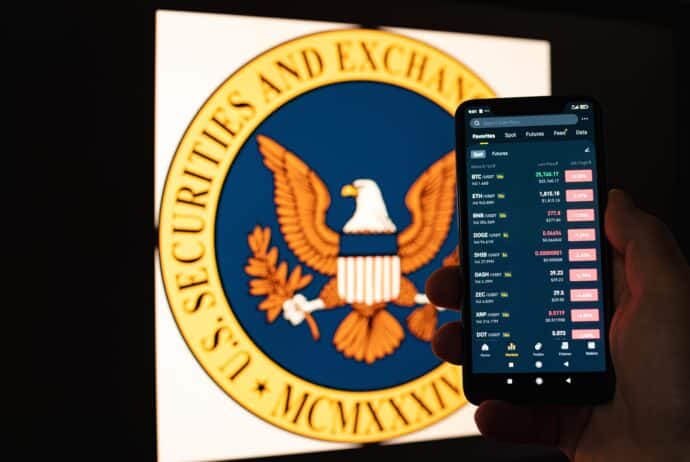Key Insights:
- Binance’s legal battle with the SEC underscores the need for clear crypto regulations in the rapidly evolving market.
- The Howey Test’s suitability for classifying cryptocurrencies is questioned, impacting future regulatory approaches.
- The outcome of this case could reshape the U.S. crypto industry’s regulatory landscape, affecting major players like Coinbase and Ripple.
In a notable courtroom face-off, Binance challenges the U.S. Securities and Exchange Commission (SEC). The crux of the matter, heard in the U.S. District Court for the District of Columbia, revolves around the SEC’s approach to cryptocurrency regulation. Binance’s legal representative, Matthew Gregory, has brought to light the issue of regulatory ambiguity, critiquing the SEC for not providing a clear regulatory path for crypto entities.
SEC’s Flexible Stance on Crypto Assets
In response, SEC lawyers have defended their position, emphasizing the adaptability of the Howey Test to determine if certain assets, including cryptocurrencies, are securities. This defense highlights the nuanced nature of financial law, especially in new and evolving markets like cryptocurrencies. Judge Amy Berman Jackson, overseeing the case, has scrutinized this approach, questioning the SEC’s classification of various crypto assets, including Binance’s own BNB and other popular tokens like Cardano (ADA) and Solana (SOL).
Moreover, the implications of this legal battle extend far beyond Binance. The outcome is set to influence the regulatory framework for the entire U.S. cryptocurrency industry. This case is particularly significant after Binance’s recent $4.3 billion settlement with U.S. regulatory bodies, including a guilty plea to a felony charge by former CEO Changpeng Zhao. The industry is closely watching the proceedings, as the court’s decision will impact how digital assets are treated under U.S. securities law.

CypherMindHQ.com Artificial Intelligence Crypto Trading System - Surpass the competition with this cutting-edge AI system! Utilize the prowess of innovative algorithms and amplify your crypto trading strategies with CypherMindHQ. Learn more today!
Debate Over Securities Definitions and Fair Notice
Central to Binance’s argument is that the SEC has been contradictory in its dealings with crypto firms. Binance’s legal team argues that while the SEC has been encouraging firms to register, it simultaneously impedes their ability to do so due to unclear regulations.
Conversely, the SEC maintains that the Howey Test, a longstanding method for identifying securities, is sufficiently clear for classifying cryptocurrencies. However, Judge Jackson has expressed skepticism, particularly about the SEC’s assertion that various tokens handled by Binance are securities.
The Howey Test, traditionally used to determine whether an instrument qualifies as a security, has become a focal point in the debate on cryptocurrency regulation. The SEC’s reliance on this test highlights the challenges of applying traditional financial laws to the rapidly evolving crypto sector. By questioning this approach, Binance is pushing for a more tailored regulatory framework that acknowledges the unique nature of digital assets.
Anticipated Impact on Future Regulatory Developments
As this legal confrontation unfolds, its ramifications will ripple through the crypto industry. The court’s decision could either affirm the SEC’s current regulatory approach or compel a reevaluation of how digital assets are governed. This case is being closely monitored by other major players in the crypto space, such as Coinbase and Ripple, as it could set a precedent for future regulatory actions.
The ongoing court battle between Binance and the SEC is pivotal in cryptocurrency regulation. Its outcome will likely influence not just the future operations of Binance but also the broader regulatory landscape of the crypto industry in the United States.



